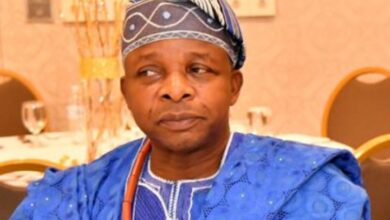Agricultural Revolution ‘ll Revive Nigeria’s Economy- Dr Fadiyimu
.. Reveals why Entrepreneurial Skill was mandated for FECA Students


EXCLUSIVE INTERVIEW
Dr Akinyemi Albert Fadiyimu is the Provost of College of Agriculture, Akure, Ondo State. He speaks with the PATH NEWS MAGAZINE on divergent issues ranging from Entrepreneurial Skills, Agricultural Revolution, Solution to Flooding, Accreditation of Courses among others.

Can we meet you Sir?
My name is Dr Akinyemi Albert Fadiyimu. I am partially from Ipetu Ijesha in Osun State and partially from Ajowa Akoko in Ondo State. I had both my elementary and secondary education at All Saint Primary School and Anglican Commercial Grammar School respectively in Osogbo. I later went to University of Ibadan for my first and second degrees. I studied Animal Science and Ph.D in Ruminant Nutrition and Pasture Management from the Federal University of Technology, Akure.
By His grace, you are the Provost of FECA; what qualified ones to be appointed into such position?
For whoever to be appointed as Provost of the institution, such person must have spent number of years in the system as a Lecturer and rose to the post of Chief Lecturer asides other academic qualifications like Ph.D in Agriculture, cognate Management experience among others.
How challenging running the affairs of the College?
Very challenging; a lot of bottleneck here and there. The most important challenge is funding which is a general problem in Nigeria. In our own peculiar case, we have issues of contention on the college’s land. We have about three cases pending in the court where some parties are contending the land with us, claiming authority over the land. To us as institution, it is a distraction as we are spending our resources on court cases most especially at this period of fund scarcity. Aside, approaching the court, some of the land agitators went violence as far as destroying our plantation. One of such cases was when a man entered our Tick Plantation and started to cut it off claiming to have court judgement. These and many more are some of the challenges we are facing as institution.

What measures have you put in place to ensure these land agitators stop destroying the college plantation?
For now, there’s no end in sight to the trouble of the self acclaimed owners of our land. We have been on this for a long time, it was a problem I inherited as a Provost. Since the cases are in Court which is the final arbiter, we are waiting for the outcome of the Court judgement. The lands are properly acquired through government gazette. We are at the Court of Appeal now because these people were able to circumvent their way at the lower Court but I know justice we prevail at the end.
What could you pin point as your major achievements since you assumed office as the Provost?
When I assumed office, virtually all our regular programmes both the Ordinary National Diploma and Higher National Diploma have lost accreditation, meaning they were due for accreditation. So, when I came in 2020, I know the implication of an institution losing accreditation for all its programmes; it is more or less that such institution is not existing again. This is the major issue I first tackled and today, by God grace, out of 12 programmes that the institution runs, we have accreditation for 7, partial accreditation for 2 and the remaining 3, we are working on its accreditation. On the partial accreditation, when the team for National Board for Technical Education (NBTE) visit the institution for accreditation, the two courses in question have one deficiency and another. To allow us make up for the deficiencies, they gave us partial accreditation, by the grace of God, this year, we are expecting the Accreditation Team to come back for Full accreditation.

What is the core mandate of the institution for economic development in Agriculture sector?
Our core mandate is to train middle man power in different areas of Agriculture. These middle man power are the Extension Officers in the ministries of Agriculture both at the State and Federal levels, Farm Managers in private and government farms and also field officers who work in bank and other financial institutions that lend credit to farmers and Agro Related business among others. We are critical stakeholders in Nigeria Agricultural development because without these categories of Man Power, definitely, the Agricultural system will collapse.

Your college has Centre For Entrepreneurship; in what area is the Centre developing the Entrepreneurial skills of the students?
Recently, the Federal Government, the National Board For Technical Education and Educational Stakeholders have seen the need to develop and beef up the Entrepreneurial skills of our youth. It is expected that we should make our students go through basic entrepreneural training and here in the college, we paid a lot of emphasis on this. All our students in respective of their courses must go through the Entrepreneurship Centre where each student is mandated to pick a skill that appeal to them outside their courses of study. We have several skills ranging from catering, sewing, soap making, Hand Wash Lotion, Adire Making, Dyeing of Cloth among others skill. Some of this skills are agricultural related while some are not. The essence of the Skill acquisitions is to ensure our students become self employed and self sufficient after graduating aside their course of study.
Is there any new initiatives introduced by your leadership since assumed office?
The Entrepreneurship Centre is one of the it because before I came in, what we were doing before is Agriculture realated enterprise but when I came on board, I widen the scope to includes those that are not agric related. If it might interest you, my cloth and cap were sew by the students. They learnt the art of sewing from the Centre which was part of my initiatives. Aside this, we took step to nurture the students in the area of value chain. Agriculture is not about production alone but includes processing, packaging, input supply among others. We are laying emphasis in these areas because they can as well eke a living in these areas. We tailor our training in value chain approach and I can boldly say part of my post training experience was agricultural value chain development which our students are introduced into.

With drop in foreign earnings on oil, do you see agriculture replacing oil as source of revenue for Nigeria in the future?
Definitely, Agriculture will soon take over Nigeria economy. Before the advent of Oil, Nigeria economy was built on Agriculture. What we need to do as a country is turning our agricultural industry around, investment and give more encouragement to it. We must change our orientation and embrace agriculture as it is used to be in the yester years. One thing we have in Nigeria and other Africa countries that stand us out is Agricultural resources. We have good land, regular rainfall and less of natural disasters like Hurricane, Earthquake that can destroy our farmland. We have what it takes to feed the whole world but it is unfortunate that the kind of agriculture we are practicing can only cater and feed ourselves. Ukraine is at war, yet, they are feeding themselves and large percentage of the world, just because of their agricultural development system. To be Self sufficient as a country, we must invest hugely in farming, develop our farmers and stakeholders in the sector.The government has a major role to play if Nigeria want to advance in the agric sector. The private sector must be encouraged to invest in agriculture by creating awareness, attract large scale investors both locally and internationally into the sector.and provide conducive environment. Investment in Large Scale Farming will no doubt provide employment for thousands of our youth and also encourage them to go Into mechanise farming. The only way to revive the country’s economy is through Agricultural Revolution.

Many States were hit by flood last year, does this potend danger to food supply chain in the country?
Yes, it does. I have said it in my previous interview that the adverse effects of flooding in most of the states worst hit is going to have negative effects on food supply. Last year flooding was massive in State like Taraba, Balyesa and other North Eastern part of the country. The most affected areas are the agricultural producing states, meaning a lot of farms have been washed away. Nigerian and government must be proactive to stop this act that has become annual occurrence.
What is the way out of this annual flooding that is having adverse effects on our source of livelihood and economy?
We need to be proactive as individual and also as government. Heavy flooding experience last year was due to climate change and what many countries are doing is taking proactive steps to mitigate the effect. Areas that are prone to flooding, government should embark on channelization and dredging of Rivers and building of dams, storage facilities among others proactive measures. All these are what our government need to strategically put in place to prevent future occurrence. When there is more rain fall, it can be Chaneled into the dams without damaging farms. Applying fire brigade approach in the period of crisis won’t stop this annual challenges, government must act fast and prepare towards the next raining season.

Thousands of Nigerian students are graduating with no hope for white collar jobs; do you see agriculture as alternative means to cushion the effect of unemployment among the youth?
Agricultural sector has potential of employing millions of people provided they are ready to work. No government has capacity to employ all the teeming graduates out there looking for white collar jobs. What the government need is to create enabling environment that will encourage our youths to embrace agriculture. The youth have the number to turn any sector around be it politics, economy, they are always at the forefront. In countries like Singapore, India, their youths lead the telecommunication industry and agriculture revolution but it is unfortunate that in our country, reverse is the case. Nigeria government must do everything possible to encourage our youth to embrace agriculture by providing conducive environment, make credit facilities accessible, subsidized farm input and provision of social amenities in the rural areas.

As an institution, what do you think the college can do to revamp the country economy that has nosedived?
The first thing is to give the youth right orientation and conducive environment to farm. As an institution, we relate with these youth and we know their character, mind set and zeal to make a positive impact into the economy of the country. Many of them want to be self employed but the conducive environment is not there. We will continue to play our role as an institution to encourage them and let them see reason why agriculture is the future of Nigeria. The era of mono economy is old fashioned because no country want to build its economy on one sector. To revive our economy, we must revamp our agriculture and if the government do the right thing, the youth will definitely key into it.The old mentality that agriculture is for the old and poor people must change. Let’s them see agriculture as lucrative business that can make them millionaires and billionaires. We train our youth in different areas of Agriculture and they can choose any area that interest them. As institution, we are also into policy formulation. We are to implement policy of government and advise stakeholders on how to implement this policy that will help revamp our comatose economy.




